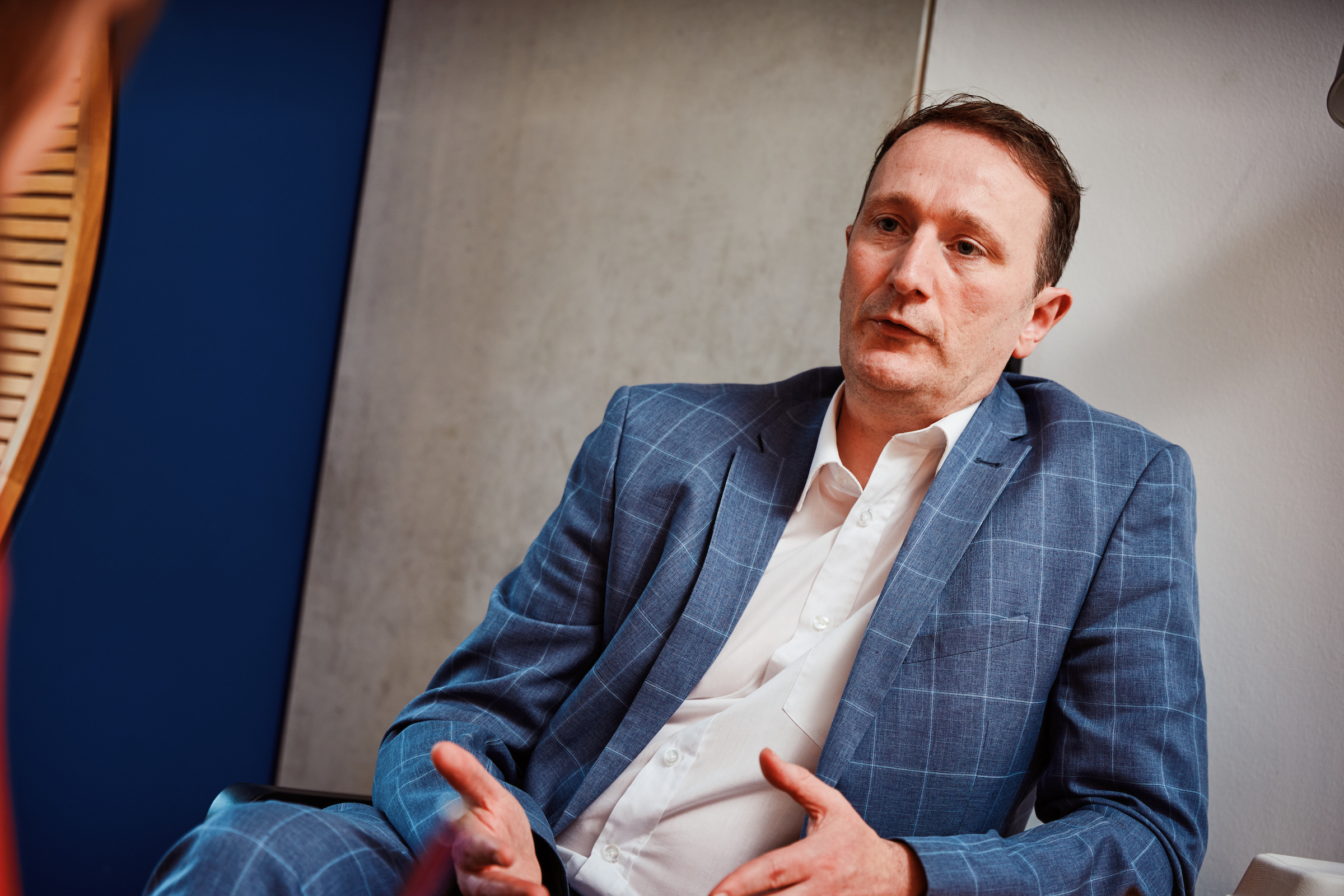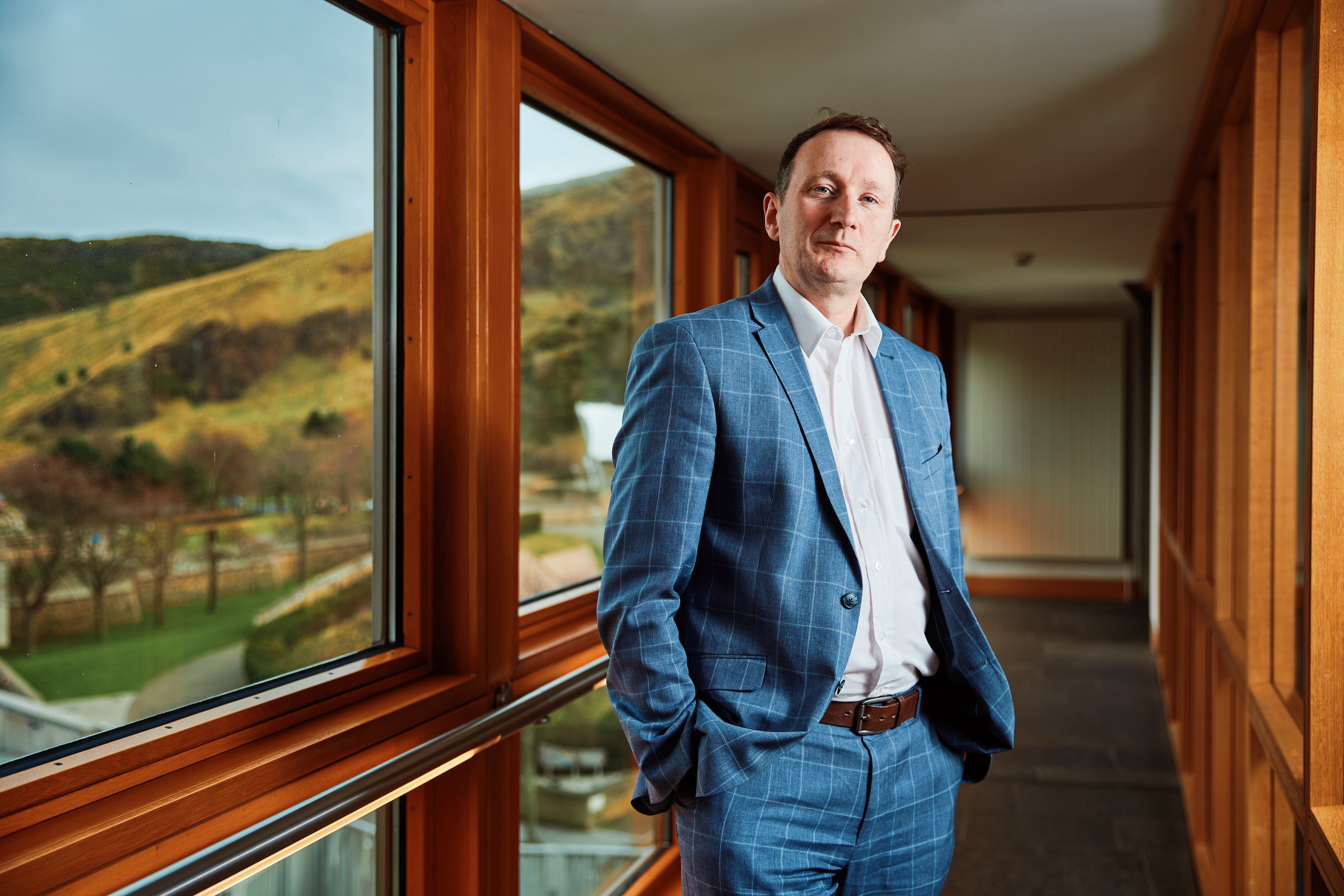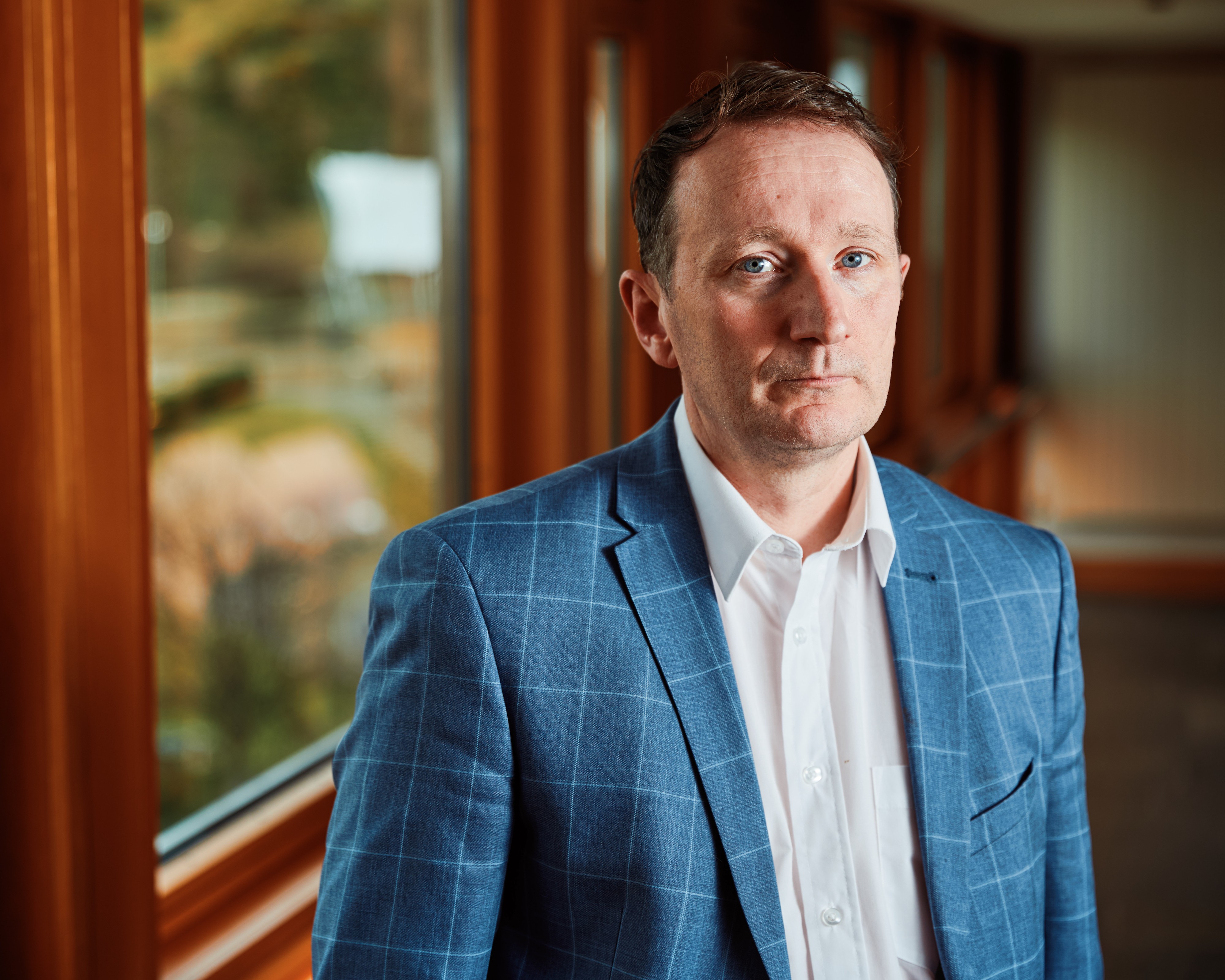Duty of Care: Ex-social worker Fulton MacGregor is on a mission to improve child protection
“The sexual and physical abuse cases from a couple of years in, they’re the ones you still think about,” says Fulton MacGregor. He wonders what happened to the children from the most harrowing cases he handled as a social worker, though he doesn’t refer to them as cases. “You shouldn’t do that,” he emphasises.
It’s been around 20 years since MacGregor entered social work, initially working in child protection before moving into criminal justice.
He was fresh out of university and the South Lanarkshire Council job was based in Lanark, a half-hour drive away from his Coatbridge home. It was, he notes, “far enough away that people didn’t know me”.
But after entering Holyrood in 2016, enough people recognised him that a number of the foster carers and young people he had previously worked with, reached out, with some even visiting him in the Scottish Parliament. “All these kids are now adults,” he goes on. “There were good outcomes and young people returning to their families or getting permanency with their forever families. When that happens, that’s a good job.
“Whenever you had to take kids into care it would play on your mind for a long time. You wouldn’t be happy about it. You should always work to try to avoid that happening; to keep people with their own family should be the number one priority. But having said that, you can’t ever leave a kid at risk.”
For proof that MacGregor has never really left that job behind him, take a look at his record in parliament. He has brought members debates on topics including sibling sexual abuse and the creation of a kindergarten stage for early years education, and sits on or convenes cross-party groups on everything from shared parenting and autism to adult survivors of childhood sexual abuse.

It is this last group, and the harrowing testimony it hears from those whose early years were blighted by horrors, which has helped put him on a path to challenging the Scottish Government to adopt the mandatory reporting of child abuse.
The step would create a legal requirement for teachers, social workers and other professionals to raise concerns about potential harms for investigation in a bid to prevent victims from falling under the radar. It is a step the UK Government is already taking, and it is one recommended by Professor Alexis Jay in her report into the grooming gangs scandal in England.
The offence is to be created under the Crime and Policing Bill covering England and Wales, and separate legislation would be required to bring it into law in Scotland. In January, First Minister John Swinney said the Scottish Government was “considering” the UK Government’s move and would look at “all relevant recommendations” from the ongoing independent Scottish Child Abuse Inquiry, which covers offending towards minors in care. Swinney has said there already exists a “professional duty” to report concerns, with failure to do so leaving them potentially in breach of their employment contracts. But MacGregor is certain that’s not enough.
In a motion submitted to parliament, he said mandatory reporting “would offer greater protection to children” and called for discussion over any “contentious aspects” of its implementation. The motion was supported by 20 MSPs including former Scottish Government ministers Kevin Stewart and Elena Whitham.
The Scottish Government has faced questions and criticism from some commentators for its failure to adopt the measure. But given the response to another intervention aimed at improving child safety – the named person scheme – perhaps its caution is understandable.
The provision was part of the wide-ranging Children and Young People Act of 2014, which was supported by all Holyrood parties but the Conservatives, who abstained. The scheme would have seen a teacher, health visitor or similar professional become a single point of contact for a child from birth to the age of 18 and was supposed to support wellbeing. But critics said it would undermine family life and the scheme’s delivery, planned for 2016, was prevented by a legal challenge which ended in the Supreme Court. While judges said its intention was “undeniably legitimate and benign”, specific proposals on information-sharing were found to be outwith the parliament’s competence. Still efforts rolled on, and it wasn’t until 2019 that Swinney, who was then education secretary, withdrew the proposal, a specially convened panel having failed to find a way to overcome the data-sharing obstacle.

MacGregor first heard about the named person scheme on a TV news bulletin. Brought in some years earlier, the Getting it Right for Every Child (Girfec) strategy of 2006 included provision for a “clear point of contact” who could offer advice or support, with no obligation on families to accept this. And so, MacGregor was far from convinced about this new measure. “I remember sitting there thinking ‘this is already happening, why are you calling it ‘named person’, people are going to go bonkers over the name’.
“I remember thinking ‘that’s a mistake’ because I knew what the families I worked with would think of that – ‘are you my named person, Fulton?’ It took away a bit of autonomy from families, using that term, which in the field is what you are working to give back.”
This was before MacGregor’s election to the Scottish Parliament in 2016, which followed a stint as a member of North Lanarkshire Council. When the time came for Holyrood to vote he had taken his seat in the chamber, and he backed the government. “I supported it as a member of the governing party, I supported it on the matter of principle, but I didn’t believe it was necessary,” he says.
“The fact is, ‘named person’ was already in before the legislation. Every child effectively has a named person, it’s your health visitor, your teacher, your guidance teacher, and if a kid needs more support, it can be someone else. The principle was already there and I didn’t think it needed legislation. They tried to formalise it a wee bit and it got lost.
“In here, we have a tendency to over-legislate,” he goes on, “it’s legislation for legislation’s sake. Hopefully I get back in [in 2026] and I will be making noises that we legislate less. The committees I’m on are piling through legislation and we’ve not even got these things enacted and we’re looking at the next thing.
“The guidance was enough. I have no idea what the government were thinking to legislate that.”
So what makes the issue of mandatory reporting so different that MacGregor is willing to press the government at FMQs, as he has done? MacGregor says he’s “been on a journey” on the issue, “probably with most of the child protection agencies in the country”.
“I didn’t initially think it was required, but testimony from survivors who have presented to the CPG and the recommendations from Alexis Jay for England and Wales, I think, add to a broad swelling of opinion now of almost everybody, apart from Scottish Government officials, that this is now required. It’s not to put pressure on already-stretched organisations, it’s to formalise the protection of children in these really scary situations of childhood sexual abuse. There’s a lot of examples of where it goes under the radar because people weren’t sure when to report. Making it mandatory takes that away.”
As many as 15 European nations have some form of reporting obligations in place, including Bulgaria, Cyprus, Ireland, Latvia and Sweden. “Where mandatory reporting is in place you get an initial spike but then it settles down and you don’t see anything greater than what’s already there, but it gives agencies and children more confidence,” MacGregor says.
“The thing that totally convinced me is survivors are asking for it and they are asking for it in their droves. The CPG has not found a single survivor who doesn’t want it, so it’s the least we can do.”
He recalls the testimony of a former pupil of a residential school who was “really upset at the slow pace” of the government’s approach to the matter. “He was crying,” MacGregor says. “He was in his late 60s, early 70s. He felt that if mandatory reporting had been in place it would have made an impact for him.”
MacGregor thinks back to his early days in social work. “I came out of university at 24, quite naive about things, and a job like that changes you quite quickly. It’s a job you wouldn’t understand if you haven’t done it, and you can’t speak to anybody else about your casework but your colleagues are bound by the same confidentiality as you are. You create a real bond. The people I worked with during those years, I’m still really friendly with.
“It gave me a really good grounding for politics. I have seen the real-life experiences of people who have either had it hard or there’s been real neglect or abuse. Sometimes it’s really just poverty that’s at the root of it.”
Poverty-related issues now make up “the vast majority” of his surgery time, he says. One of four boys, MacGregor grew up in the Coatbridge and Chryston constituency he now represents and is the first SNP politician to hold the seat. His early years included a period living in a high-rise where he and a friend became trapped in the lift, and the experience led to a fear of elevators that persists to this day. MacGregor walks the three floors to his Scottish Parliament office and takes the stairs everywhere else too.
The phobia came up during a trip to Paris with now-fiancée Lynsay six months after they started dating. He hadn’t told her about it, and so she didn’t blink when booking a hotel room on the 13th floor. Luckily it didn’t put Lynsay off and the pair, who have three children, will marry in August, with MacGregor wearing the striking red-and-green dress kilt he donned for his oath of allegiance in 2016. The tartan? Macgregor Hunting Modern.
If he was embarrassed about the lift thing then, he’s shrugged that off now. “I don’t think I’ll ever lose it,” he says of the phobia. “Everybody’s got one. I don’t mind spiders or anything like that.”
But something that does concern him is the challenge presented by Nigel Farage’s Reform UK in the next Scottish Parliament election. Swinney has denounced the rival party as “far-right”, which is a description MacGregor agrees with, with one caveat. “I think Reform are far-right, but I don’t think everybody who votes for them is far-right. There will be people who are struggling in their own lives, or who are scunnered with politics. I have seen people I know and went to school with sharing their stuff and they’re decent, normal people.
“You’ll see people sharing messaging that says things like ‘if we can afford to pay for refugees then we can afford to look after our older people’. If you’re not involved in politics, that sounds like common sense. It’s our job to explain why it doesn’t make sense.
“I don’t like describing Farage and Reform as populists,” he goes on. “I know it’s the cool word to use just now but if you are calling somebody populist there is the sense that you are calling them popular. I don’t think that’s what people are meaning – Reform aren’t going to be that popular come the Scottish Parliament election; they’ll maybe get 10 to 15 per cent and it will get them seats but they’re not going to be a major player – but if you keep saying that you reinforce a sense that they are popular.”

While the results of the 2026 election are far from certain, there’s no doubt that the parliament will look very different when the votes come in, thanks to the swathe of current MSPs who are standing down. Most of those who have announced their plans to leave Holyrood are from the SNP benches, and MacGregor knows what he wants to see in the new intake, should the party be so lucky. “People who have got commitment, want to do hard work, want to get stuck in,” he says.
“I really believe that everybody should be strong in their constituency. If every constituency is represented really strongly, you get that patchwork across the country. Everything I do is constituency-related, but that can be difficult for people who become ministers or cabinet secretaries. I would like to see more women.
“We have done well with getting more women into politics and I wouldn’t want to see a whole host of women stepping down and being replaced by men – we don’t want our party going back to being a boys’ club. I would like to see more BME candidates. There’s an opportunity there – the more experience we have across the country, the richer our party will be. But ultimately, it’s down to members to pick.”
Unchallenged for candidacy this time, MacGregor was at the centre of a notoriously bitter selection battle ahead of the 2016 vote, when disagreement amongst activists saw party HQ take over the running of his election campaign. Local feuding had been so bad that the Coatbridge and Chryston branch was suspended by SNP bosses, and MacGregor was part of a group dubbed the “Monklands McMafia” which was close to then-MSPs Richard Lyle and Alex Neil, with a rival faction focused around then-MP Phil Boswell. MacGregor laughs at a reminder of this but admits he wouldn’t have done so at the time – despite teasing from friends.
“I’m very loyal but I have got my own mind,” he says. “I’m loyal to the party but I don’t agree with everything we do. I’m very loyal to John; I think John is great. He’s very much steadied the ship, and I think he can get us through this difficult period.”
Holyrood Newsletters
Holyrood provides comprehensive coverage of Scottish politics, offering award-winning reporting and analysis: Subscribe